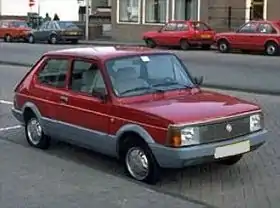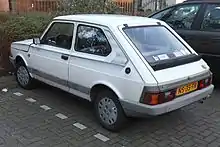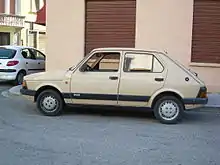SEAT Fura
The SEAT Fura was a supermini car based on the Fiat 127 which was produced by Spanish car manufacturer SEAT between 1981 and 1986. SEAT had been building the preceding 127 since April 1972.[1] Sales commenced in January 1982.
| SEAT Fura | |
|---|---|
 | |
| Overview | |
| Manufacturer | SEAT |
| Production | 1981–1986 84,973 produced |
| Body and chassis | |
| Class | Supermini (B) |
| Body style | 3-/5-door hatchback |
| Related | Fiat 127 |
| Powertrain | |
| Engine | 903 cc OHV I4 1,438 cc OHV I4 |
| Transmission | 5 speed manual |
| Chronology | |
| Predecessor | SEAT 127 |
| Successor | SEAT Ibiza (1984) |


Once the license to the 127 had expired, SEAT was forced to develop a new version with a new name which was introduced in end of 1981 for the 1982 model year.[1] It was available in three- and five-door hatchback body styles. The two- and four-door sedan versions of the 127 were discontinued. The Fura was never available with the larger 1,010 cc unit which had been seen in the SEAT 127, but unlike the earlier car it did receive a five-speed manual transmission as standard.[2]
After the facelift of 1983, the SEAT Fura Dos (two) was introduced: it doesn’t differ much from its predecessor, mainly through smaller headlights and turn signals. The launch of the first generation SEAT Ibiza, in April 1984, made the car largely redundant.[3][4]
For slightly more than one year these two compact hatches competed internally, but the outmoded Fura was officially discontinued in December 1986.[5] A hot hatch called the "Fura Crono" was introduced in the beginning of in 1983.
Fitted with spoilers front and rear, as well as twin foglights up front and unique 13” alloy wheels, it was powered by a 75 PS (55 kW) 1,438 cc four cylinder.[6] The twin carb engine was the same as used in the Fiat/SEAT 124 and provided a top speed of 160 km/h (99 mph) while the 100 km/h sprint was managed in 10.8 seconds.[1]
The car was also assembled by Nasr in Cairo, as the El Nasr Super Fura.
Motorsport
The SEAT Fura Crono was used in the Copa Fura one make rally series which was launched in 1983 and terminated in 1985.[7][8] These cars were tuned by Abarth and produced 90 PS (66 kW).[9]
References
| Wikimedia Commons has media related to SEAT Fura. |
- Büschi, Hans-Ulrich, ed. (March 10, 1983). "Automobil Revue '83" (in German and French). 78. Berne, Switzerland: Hallwag, AG: 492–493. ISBN 3-444-06065-3. Cite journal requires
|journal=(help) - World Cars 1982. Pelham, NY: L'Editrice dell'Automobile LEA/Herald Books. 1982. p. 215. ISBN 0-910714-14-2.
- Culmer, Kris (7 December 2017). "Throwback Thursday: 1984 Seat Ibiza first drive". autocar.co.uk. Retrieved 22 October 2020.
- "SEAT Ibiza's launch was in 1984". clubs1.net. 31 January 2017. Retrieved 22 October 2020.
- "SEAT 127" (in Spanish). Motor Mania. 3 June 2003. Retrieved 8 September 2012.
- Glon, Ronan (1 January 2012). "Sunday classic: SEAT Fura Crono". Ran When Parked. Retrieved 11 February 2012.
- "Historia: SEAT Fura". seatfansclub.com. 19 November 2011. Retrieved 22 October 2020.
- "1980–1989: SEAT History". SEAT UK. 11 February 2012. Retrieved 11 February 2012.
- "SEAT Fura Crono Gr. B (De 1982)". seatfansclub.com. 20 July 2004. Archived from the original on 20 July 2004. Retrieved 22 October 2020.

